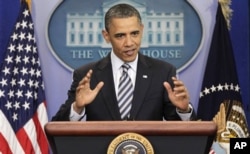An attorney in Republican Senator Ted Cruz's home city of Houston, Texas, has filed a lawsuit challenging his eligibility to serve as president of the United States because he was born in Canada.
The complaint was filed Tuesday in U.S. District Court in Houston by Newton B. Schwartz, 85.
Speaking to VOA by phone, Schwartz said that if Cruz goes on to win the nomination and the presidential election, it could create a constitutional crisis.
"Why would we want an ineligible candidate for president to win it?" he asked. "Can you think of the problems that would occur?"
Some major constitutional law experts have raised questions about Cruz's eligibility, citing the U.S. Constitution's requirement that a president be a "natural-born citizen."
This has traditionally been interpreted to mean a person born on U.S. soil.
Cruz's main rival for the Republican presidential nomination raised the issue in recent days. Billionaire real estate developer Donald Trump posed the question of what would happen if Cruz were declared ineligible after winning the nomination.
In Tuesday night's Republican presidential debate, amid a sharp exchange with Trump, Cruz answered Trump's challenge: "The facts and the law are really quite clear. Under long-standing U.S. law, ‘the child of a U.S. citizen born abroad is a natural-born citizen.’ “
In the debate, Cruz also dismissed comments made recently by his onetime law professor at Harvard University, Lawrence Tribe, who has called the question of Cruz's eligibility to be president "murky and unsettled."
Cruz said Tribe was "a left-wing judicial activist" and a supporter of Democratic presidential candidate Hillary Clinton.
The argument between Cruz and Trump marked a departure from what had been a chummy relationship between the two Republicans.
Cruz, Obama similarities
Cruz, who is favored by some polls to win the Iowa caucuses in February, was born of an American mother and a Cuban father in Calgary, in the province of Alberta, Canada, in 1970.
His case is similar to the one often made against President Barack Obama by some in the Republican Party's conservative wing, the source of much of Cruz's support.
The so-called "birthers" claimed Obama had been born in Kenya to a U.S. mother and Kenyan father. The state of Hawaii later disproved that by producing his birth certificate.
Schwartz does not buy the Cruz argument that any person born of at least one U.S. citizen parent abroad is a natural-born citizen.
"A natural-born citizen of the United States requires that you have to be born in the United States or overseas to an American citizen who is there furthering the work of the United States government," he said.
That means, according to Schwartz, that Senator John McCain, who was born in Panama and was the Republican presidential candidate in 2008, was eligible because his parents were U.S. citizens and his father was a Navy officer serving in what was then the U.S.-administered Panama Canal Zone.
The same would apply to U.S. diplomats serving in foreign countries, he said.
Schwartz said he has no partisan motivation in filing the suit and is eligible to do so as a U.S. voter.
He said he paid the $400 filing fee himself, with no involvement of anyone involved in politics. He said he has voted for both Republicans and Democrats for president in the past, although this year he favors Democratic candidate Bernie Sanders.
Doing Cruz a favor
Schwartz said getting this question of constitutional eligibility out of the way now could actually help Cruz.
"He should invite this lawsuit," Schwartz said. "I have done him a favor. All he has to do is appear in it and he may probably win it. But if he blocks it, showing that he does not want it brought up, for a politician, the last thing I would want to do is block a suit that enables me to declare that I am eligible [to be] president."
Past questions of eligibility
Challenges to a candidate's eligibility to be president are not new, but they are relatively rare.
Foes of President Chester Arthur claimed he had been born in Canada rather than Vermont, but he served in the White House from 1881 to 1885 without any serious challenge to his legitimacy, despite claims that persist to this day.
In 1964, Senator Barry Goldwater won the Republican presidential nomination even though questions were raised about his having been born in Arizona when it was still a territory and not a state. The question never gained much traction and was made moot when President Lyndon Johnson defeated Goldwater in a landslide.
Legal scholars say there is ambiguity in the words "natural-born citizen" that needs to be resolved.
If the lawsuit filed in Houston this week is challenged and ends up going to the U.S. Supreme Court in Washington, a clear judgment on the issue would resolve the matter not only for Cruz, but for any future presidential aspirant whose birth occurred outside the boundaries of the country.







